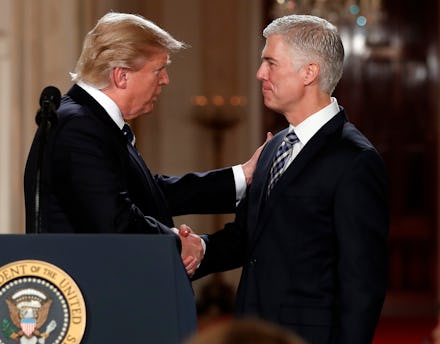Neil Gorsuch's political views: Here's where Trump's SCOTUS pick stands on the issues

On Tuesday night, President Donald Trump officially nominated Neil Gorsuch, a 49-year-old federal appellate judge from Colorado, to fill the Supreme Court seat Justice Antonin Scalia vacated when he died suddenly in 2016.
"Judge Gorsuch has outstanding legal skills, a brilliant mind, tremendous discipline and has earned bipartisan support," Trump said. "When he was nominated to the Tenth Circuit Court of Appeals, he was confirmed by the Senate unanimously."
Bipartisan support, however, is unlikely to recur for Gorsuch's Supreme Court confirmation vote, as Democrats have come out as largely opposed to Gorsuch's nomination. Sen. Chuck Schumer (D-NY) told CNN that he had "serious doubts" about Gorsuch and added that the nominee requires the support of 60 senators to be confirmed, hinting that Democrats would filibuster him.
Sen. Richard Blumenthal (D-Conn.) also shared his concern with CNN: "An extreme ideologue on the court will threaten privacy rights, including women's health care, worker and consumer protections and public health and safety."
Where does Gorsuch stand on America's most pressing issues? Here's what you need to know.
Immigration
Gorsuch took on the 2016 Gutierrez-Brizuela v. Lynch immigration case for the 10th U.S. Circuit Court of Appeals. He granted an undocumented person's petition for review of a Board of Immigration Appeals order, which dictated that he was not eligible to seek lawful residency. But rather than addressing the issue of immigration specifically, he wrote in a separate concurrence about the "tension between separation of powers doctrine," Reuters reported. It remains to be seen whether Gorsuch would weigh in on Trump's recent immigration plans.
Gun rights
Gorsuch defends gun possession, as described in his dissent on the 2012 United States v. Games-Perez case. According to the case, defendant Miguel Games-Perez owned a gun after having been convicted of a felony he didn't know he committed.
For the criminal law to apply, Gorsuch argued, the felon needs to know that he possesses a gun and that he needs to know he's a felon himself. Otherwise, the felon convicted of owning a gun "might very well be wrongfully imprisoned." He added that there is "a long tradition of widespread lawful gun ownership by private individuals" and that the Second Amendment "protects an individual's right to own firearms."
It's no wonder the National Rifle Association supports Gorsuch's nomination.
Same-sex marriage and LGBT rights
According to the Bilerico Report on LGBTQ Nation, Gorsuch has not dealt with any cases that directly tackle LGBTQ rights, which makes it difficult to know where he stands on this issue. In a 2005 column for the National Review, Gorsuch did not write whether or not he supported same-sex marriage, yet he added that liberals' stance on the matter could backfire.
"But in failing to reach out and persuade the public generally, [liberals] invite exactly the sort of backlash we saw in November when gay marriage was rejected in all eleven states where it was on the ballot," he wrote.
Notwithstanding, renowned pro-LGBTQ rights organizations such as the Human Rights Campaign reject Gorsuch's nomination given his "long and troubling career opposing civil rights, including for LGBTQ people." The organization added, "We have no reason to believe he will be an advocate for LGBTQ Americans, and we urge senators to vote 'no.'"
Abortion and reproductive rights
In 2013, Gorsuch joined the 10th Circuit's decision in Hobby Lobby Stores Inc. v. Sebelius, which ruled that federal law does not allow the Department of Health and Human Services to require for-profit corporations to provide contraceptive coverage as part of the employer's health insurance plan.
During the third presidential debate, Trump promised that he would appoint anti-abortion-rights Supreme Court justices, who could overturn Roe v. Wade if given the opportunity, but it is uncertain if Gorsuch would do so. "We need to know whether Judge Gorsuch would do just that," Nancy Northup, CEO of the Center for Reproductive Rights, said in a press release. "Our Constitution guarantees a woman's right to safe, legal abortion. Any effort to gut those protections would harm the rights and health of women for generations to come."
Drug policy
According to AlterNet, Gorsuch hasn't ruled in any particular case that takes up the issue of marijuana policy. But in Feinberg v. Commissioner of Internal Revenue, he ruled against a Colorado marijuana dispensary that was reluctant to share data about its operation to the IRS since marijuana is still illegal under federal law. Gorsuch, however, recognized the discrepancy between state and federal policies regarding drug policy.
Religious freedom
Some of Gorsuch's high-profile cases are related to religious practices. In his 2014 majority decision on Yellowbear v. Lampert, he argued that prison officials violated prisoner Andrew Yellowbear's religious rights by restricting his access to the sweat lodge, which is critical to his beliefs. He wrote:
Andrew Yellowbear will probably spend the rest of his life in prison. Time he must serve for murdering his daughter. With that much lying behind and still before him, Mr. Yellowbear has found sustenance in his faith. No one doubts the sincerity of his religious beliefs or that they are the reason he seeks access to his prison's sweat lodge — a house of prayer and meditation the prison has supplied for those who share his Native American religious tradition.